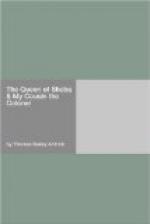The shop-shutters were still up, and no feather of smoke was curling from the one chimney of Dutton’s little house. Dr. Meeks rapped smartly on the door without bringing a response. After waiting a moment he knocked again, somewhat more heavily, but with like ill success. Then he tried the latch. The door was bolted.
“I think the lad must be sick,” said Dr. Meeks, glancing hurriedly over his shoulder at his companions. “What shall we do?”
“I guess we’d better see if he is,” said a man named Philbrick. “Let me come there,” and without further words Philbrick pressed his full weight against the pine-wood panels. The rusty fastening gave way, and the door flew open. Cold as it was without, a colder breath seemed to issue from the interior. The door opened directly into the main apartment, which was Dutton’s shop and sleeping-place in one. It was a lovely morning, and the sunshine, as if it had caught a glitter from the floating points of ice on the river, poured in through a rear window and flooded the room with gold. James Dutton was lying on his pallet in the farther corner. He was dead. He must have been dead several hours, perhaps two or three days. The medal lay on his breast, from which his right hand had evidently slipped. The down-like frost on the medal was so thick as to make it impossible to distinguish the words—
“For bravery on the field of battle.”



